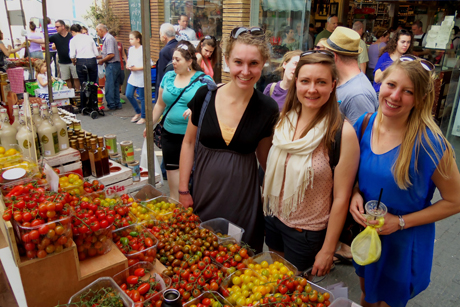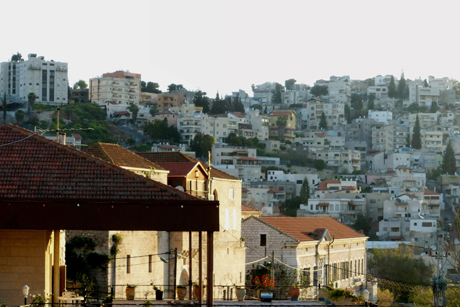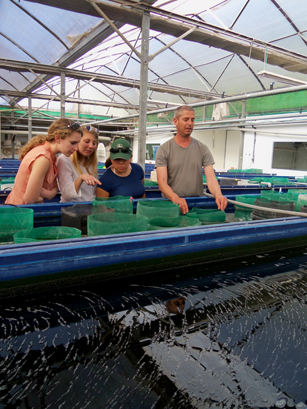Trip provides insights in Israeli agribusiness
By Stacey Shackford


It boasts thriving organic farming communities, a regional reputation for wine and a dairy industry that claims the highest average milk production per cow in the world. No, it’s not New York state, but Israel, where 15 students recently traveled for an intensive one-week trip.
The March trip was part of Cornell’s Agribusiness Fellows Program and the course, International Agribusiness Study Trip.
“We have to look at agriculture and food systems from a more global perspective. One way to do that is to see how other countries have evolved and adapted their agricultural systems,” said Todd Schmit, associate professor in the Charles H. Dyson School of Applied Economics and Management, who helped lead the trip. “[The students] really got a broader perspective about how things are done differently, or perhaps similarly, to the United States.”
Israel is a leader in agricultural research and development, influenced, in part, by its variation variable climatic, topographical and soil conditions throughout its regions. The compact size of the country – roughly equivalent to New Jersey – meant students could experience this variety via day trips, traversing deserts and lush landscapes alike.
Israel produces roughly 70 percent of all its food requirements and has significant exports in fruit, vegetables and flowers/ornamentals, many of which are grown year-round in greenhouses to meet counter-season demands.
About 5 percent of Israel’s population live within unique agricultural communities of kibbutzim and moshavim, higher than the roughly 2 percent of the population that live on farms in the United States, and Schmit said they served as interesting case studies for comparison with U.S. cooperatives.

Before setting off, the students – whose majors ranged from food science and business to animal science and landscape architecture – were split into groups and assigned research topics about their destination, such as its culture and history, economy, politics and agriculture.
During the trip, they attended lectures at the Robert H. Smith Faculty of Agriculture, Food and Environment at the Hebrew University of Jerusalem and visited a variety of business sites, from traditional vegetable farms to research greenhouses, a robotic dairy, a small ruminant/goat farm, a spice farm, a fish farm, an apiary, halva and oil seed processing facilities, and wineries.
Katie Grandle ’13 said she was inspired by nearly every aspect of the trip. She was impressed by the passion of farmers who were willing to stick to their principles rather than give in to market pressures, and of researchers who seemed genuinely devoted to sharing their knowledge and technological developments.
“We met Haim Rabinowitch, the guy responsible for increasing tomato shelf life from three days to three weeks in the 1970s. He told us, ‘If there’s a dogma, challenge it,’ which I think is very important for college students to hear,” Grandle said.
She was also struck by how religion was a lens through which Israelis “view everything, including farming,” Grandle said. “Part of the reason they farm organically is they consider the land a gift from God – why would you ruin a gift by dumping chemicals on it?”
“It was really exciting to know that for this very diverse group of students, all of them really thought that the program was interesting and relevant,” said co-leader and Israeli native and research physiologist Elad Tako, a food science courtesy assistant professor.
The trip, which also was co-led by food science senior lecturer Alicia Orta-Ramirez, was funded by the CHS Foundation (via the Agribusiness Fellows Program), Department of Food Science, Mario Einaudi Center for International Studies, Stanley Warren Teaching Endowment and several individual donors.
Stacey Shackford is staff writer at the College of Agriculture and Life Sciences.
Media Contact
Get Cornell news delivered right to your inbox.
Subscribe